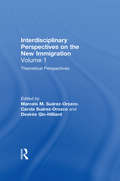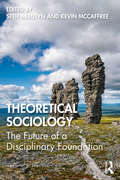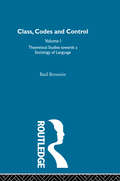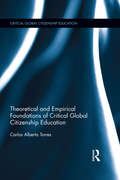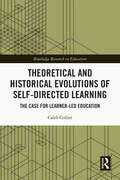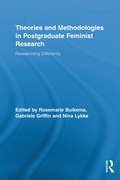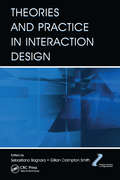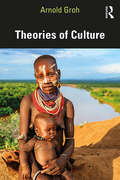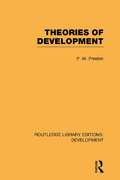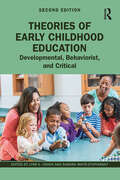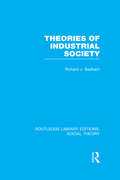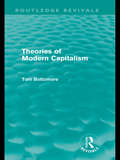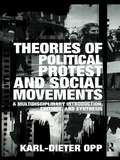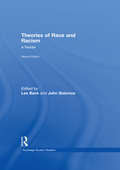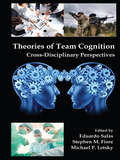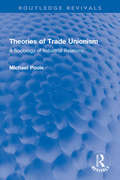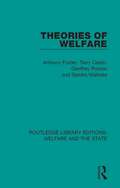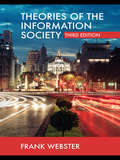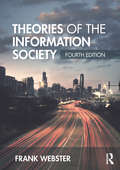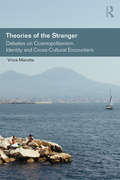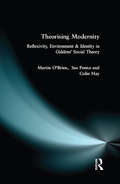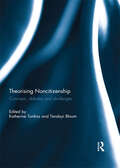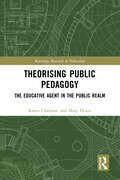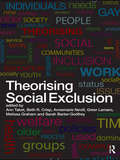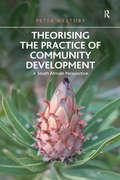- Table View
- List View
Theoretical Perspectives: Interdisciplinary Perspectives on the New Immigration
by Marcelo M. Su Carola Su DesirThis six-volume set focuses on Latin American, Caribbean, and Asian immigration, which accounts for nearly 80 percent of all new immigration to the United States. The volumes contain the essential scholarship of the last decade and present key contributions reflecting the major theoretical, empirical, and policy debates about the new immigration. The material addresses vital issues of race, gender, and socioeconomic status as they intersect with the contemporary immigration experience. Organized by theme, each volume stands as an independent contribution to immigration studies, with seminal journal articles and book chapters from hard-to-find sources, comprising the most important literature on the subject. The individual volumes include a brief preface presenting the major themes that emerge in the materials, and a bibliography of further recommended readings. In its coverage of the most influential scholarship on the social, economic, educational, and civil rights issues revolving around new immigration, this collection provides an invaluable resource for students and researchers in a wide range of fields, including contemporary American history, public policy, education, sociology, political science, demographics, immigration law, ESL, linguistics, and more.
Theoretical Sociology: The Future of a Disciplinary Foundation
by Seth Abrutyn Kevin McCaffreeSince Durkheim’s influential work a century ago, sociological theory has been among the most integrative and useful tools for social scientists across many disciplines. Sociological theory has nevertheless, due to its usefulness, expanded so very broadly that some wonder whether the concept of "general theory," or even the attempt to link middle-range theories, is still of any use. This book, a collection of top theorists reflecting on the present and future of the craft, addresses this most important question.Taking their lead from Jonathan Turner’s important recent work, and drawing on their own broad experience, Seth Abrutyn and Kevin McCaffree have organized the chapters in this book from the general, integrative and review-focused bookend chapters to more specific chapters on innovations in theory construction at the micro, meso and macro levels. Moreover, the book’s microsociological content on interpersonal violence, solidarity, identity and emotion coheres with chapters in mesosociological dynamics on class, education and networks, which in turn integrate with the chapters on inequality, justice, morality and cultural evolution found in the section on macrosociology. The distinguished contributors share a distinct commitment to the development, innovation and relevance of general sociological theory. This volume is an invaluable sourcebook for advanced students and social science faculty interested in understanding how sociological theory’s past and present are informing its future.
Theoretical Studies Towards a Sociology of Language
by Basil BernsteinThe papers in this volume show the origin and development of Bernstein's theoretical studies into the relationships between social class, patterns of language use and the primary socialization of the child.'Bernstein's hypothesis will require [teachers] to look afresh not only at their pupils' language but at how they teach and how their pupils learn.'Douglas Barnes, Times Educational Supplement'His honesty is such that it illuminates several aspects of what it is to be a genius.'Josephine Klein, British Journal of Educational Studies
Theoretical and Empirical Foundations of Critical Global Citizenship Education (Critical Global Citizenship Education)
by Carlos Alberto TorresIn the first volume in the Critical Global Citizenship Education series, Torres combines theoretical and empirical research to present an original perspective on global citizenship education as a vitally important way of learning in a globalized world. In examining the requirements for effective global citizenship education and education reform, he investigates pathways to citizenship-building at the local, national and global levels and urges development of teaching methods, teacher education, and curriculum within a social justice education framework. Taking into account post-colonial perspectives, political realities at play, and practical implications, Torres provides a succinct but comprehensive understanding of how global citizenship education can expand the concept of civic education in a global society and interrupt inequality. This volume considers the ways that global citizenship education has been incorporated and is used by international institutions, governments, and the academy, and provides a clear framework for anyone struggling to make sense of the tensions and complexities of global citizenship education today.
Theoretical and Historical Evolutions of Self-Directed Learning: The Case for Learner-Led Education (Routledge Research in Education)
by Caleb CollierThis book analyzes the deep historical and theoretical roots of self-directed learning models in order to put forward a new conceptual understanding of self-directed learning. It utilizes philosophical methods to present arguments, both historical and contemporary, in favor of shifting education toward self-directed models and away from a view of education that places teachers, administration, curriculum, and standards at the center of the learning endeavor. This book demonstrates that self-directed learning has proven to be effective in numerous contexts and builds on this history to present a new philosophy of education termed "Eudemonic Self-Directed Learning," for individual and societal flourishing. Exploring exemplars from different cultural and historical settings to inform post-pandemic pedagogies and policies, this book will appeal to scholars and researchers of the history and philosophy of education, with interests in self-directed learning and its potential for contemporary practice.
Theories and Methodologies in Postgraduate Feminist Research: Researching Differently (Routledge Advances in Feminist Studies and Intersectionality)
by Gabriele Griffin Rosemarie Buikema Nina LykkeThis volume centers on theories and methodologies for postgraduate feminist researchers engaged in interdisciplinary research. In the context of globalization, this book gives special attention to cutting-edge approaches at the borders between humanities and social sciences and specific discipline-transgressing fields, such as feminist technoscience studies.
Theories and Practice in Interaction Design
by Craig E. RasmussenAd hoc and interdisciplinary, the field of interaction design claims no unified theory. Yet guidelines are needed. In essays by 26 major thinkers and designers, this book presents the rich mosaic of ideas which nourish the lively art of interaction design. The editors introduction is a critical survey of interaction design with a debt and contribut
Theories of Culture
by Arnold GrohThis authoritative but concise guide describes the most significant cultural theories from the 19th to the 21st century and their originators, as well as the links between them and their mutual influences. This guide explores ideas around what culture is, when and why cultures change over time and whether there are any rules or principles behind culture-related phenomena and processes. For those seeking to answer questions on culture, familiarity with these topics is essential. From refugee movements caused by wars, to the ongoing demographical changes in regions of the world like sub-Saharan Africa or the Indian subcontinent, understanding the underlying mechanisms of culture-related processes has become an immediate and essential task. Covering everything from the processes of cultural change to counterculture and destabilisation, the book explains different ideas in a clear and objective fashion and includes approaches that have been unduly neglected but which have high explanatory value regarding culture and its phenomena. Providing readers with an up-to-date idea of what culture is, and how our understanding of it has been established over the past century, this text is the perfect companion for advanced undergraduates, postgraduates and researchers.
Theories of Development: An Introduction To Classical And Contemporary Theories Of Development And Their Application To Southeast Asia (Routledge Library Editions: Development)
by Peter PrestonDr Preston’s book, first published in 1982, presents a critical history of development studies since the Second World War, linking the recent, neo-Marxist, debate with the whole tradition in the field, going back to the work of economists like Arthur Lewis. He identifies a series of ‘schools’ and evaluates their contribution, supplying in each case a careful analysis, informed by the sociology of knowledge, of the work of its leading theorists. His final assessment draws on the critical theory of Habermas, arguing that social theorising is essentially practical; a matter of the construction, criticism and comparative ranking of ideologies, and that theorists should therefore consider what it makes sense for them to do or say, given their circumstances and the problems they address.
Theories of Early Childhood Education: Developmental, Behaviorist, and Critical
by Lynn E. Cohen Sandra Waite-StupianskyTheories of Early Childhood Education continues to provide a comprehensive overview of the various theoretical perspectives in early childhood education from developmental psychology to critical studies, Piaget to Freire. This revised and updated edition includes additional chapters on Michael Alexander Halliday’s view of language learning and the attachment theory work of John Bowlby and Mary Ainsworth. Each author questions assumptions underpinning the use of theory in early childhood education and explores the implications of these questions for policy and practice. Theories reported in this book are a timely reminder of the importance of the relationship between theory and practice necessary for teacher candidates, teacher educators, and early childhood teachers. Students will learn the fundamentals while in-service teachers and professionals will learn the theory behind field observations for their certification exams.
Theories of Industrial Society (Routledge Library Editions: Social Theory)
by Richard BadhamThe concept of industrial society plays a dominant role in the social sciences. The ‘Great Divide’ between pre-industrial and industrial societies is commonly assumed to be the main bridge separating modern societies from the past, and distinguishing ‘developed’ from ‘undeveloped’ states in the present era. In history, economics, politics and sociology the concept of industrial society underlies a wide variety of discussions, particularly those relating to economic development and social progress. Outside academic writing, too, the concept exerts a great deal of influence. In the developing world, there is a widespread concern to ‘industrialise’, whilst in the developed world there is growing uneasiness as to whether ‘industrialisation’ is beneficial or not, but still the concept is central. This book examines critically the concept of industrial society, its pervasiveness and influence. It reviews all the major theories of industrial society and the research into the changing character of post-industrial societies. It argues that the decision to use the concept severely restricts the social imagination, and that the concept becomes increasingly less useful as criticism of the equating of industrialisation with social progress grows.
Theories of Modern Capitalism (Routledge Revivals)
by Tom BottomoreFirst published in 1985, Theories of Modern Capitalism provides a succinct study of Marxist and non-Marxist theories of Capitalism, its recent development, and the prospects of a transition to socialism. The study begins with a critical examination and comparison of four major theories of capitalism, in the works of Marx, Weber, Schumpeter and Hayek. This is followed by an analysis of the most recent phase of capitalism which has been conceptualised by Marxists thinkers in various ways as 'organised capitalism'', 'state monopoly', or 'late capitalism'. Finally, Bottomore considers the question of a 'transition to socialism' in the diverse interpretations which have been offered by Marxists on one side, and by Weber, Schumpeter and Hayek on the other. Theories of Modern Capitalism will be valuable in a wide range of courses in social and political theory, and will also have an appeal to a broader readership concerned with issues of social and economic policy.
Theories of Political Protest and Social Movements: A Multidisciplinary Introduction, Critique, and Synthesis
by Karl-Dieter OppPolitical protest and social movements are ubiquitous phenomena. This book focuses on the current theoretical approaches that aim at explaining them: the theory of collective action, the resource mobilization perspective, political opportunity structure theory, the identity approach, the framing perspective, and the dynamics of contention approach. The book has three objectives: (1) Many basic concepts like political opportunities or identity are not clearly defined. It is further often a matter of interpretation what factors are supposed to affect which phenomena. The first aim is therefore to provide a detailed introduction to and a clear restatement of the theories. Only then is it possible to assess and improve them. (2) For each theory the major strengths and weaknesses are discussed, and various modifications and extensions are suggested. (3) Building on these analyses, it is shown how the theories can be integrated into a single theoretical paradigm: the structural-cognitive model.
Theories of Race and Racism: A Reader (Routledge Student Readers)
by Les Back; John SolomosTheories of Race and Racism: A Reader is an important and innovative collection that brings together extracts from the work of scholars, both established and up and coming, who have helped to shape the study of race and racism as an historical and contemporary phenomenon. This second edition incorporates new contributions and editorial material and allows readers to explore the changing terms of debates about the nature of race and racism in contemporary societies. All six parts are organized around the contributions made by theorists whose work has been influential in shaping theoretical debates. The various contributions have been chosen to reflect different theoretical perspectives and to help readers gain a feel for the changing terms of theoretical debate over time. As well as covering the main concerns of past and recent theoretical debates it provides a glimpse of relatively new areas of interest that are likely to attract more attention in years to come.
Theories of Team Cognition: Cross-Disciplinary Perspectives (Applied Psychology Series)
by Eduardo Salas Stephen M. Fiorea Michael P. LetskyCognitive processes in teams have been a valuable arena for team researchers to explore. Team cognition research advances and informs a variety of disciplines, including cognitive and social sciences, engineering, military science, organizational science, human factors, medicine, and communications. There has been a great deal of progress in the team cognition literature, yet the field is still in its early stages of maturity. There is much more to be gained from the field’s insights and there is a need to unite the diverse array of scholarly ideas that permeate the field. This movement will serve to organize the research and ideas that have surfaced in the field, thereby making them more accessible to different disciplines while at the same time, motivating continued progress in the field. This book aims to be a step in this direction and acts as a forum for leading scholars to share their ideas, theories, models, and conceptions about what matters and where more attention is needed in the field of team cognition.
Theories of Trade Unionism: A Sociology of Industrial Relations (Routledge Revivals)
by Michael PooleFirst published in 1981, Theories of Trade Unionism traces the development of trade union theory from its nineteenth-century foundations to the more advanced conceptual models present at the time of original publication. The book surveys the main tributaries of modern approaches – the moral and ethical, the revolutionary, the defensive or conservative, and the economic and political – and analyses the work of contemporary industrial relations scholars. This includes the main types and varieties of systems theory, the disparate pluralist approaches and the ‘radical school’. The book identifies links between the differing premises of the various schools of thought, and combines the main perspectives in a higher analytical and conceptual unity. It concludes with a discussion of a number of avenues for theoretical and conceptual progress. Theories of Trade Unionism is ideal for those with an interest in the history of trade union theory.
Theories of Welfare (Routledge Library Editions: Welfare and the State #2)
by Sandra Walklate Anthony Forder Terry Caslin Geoffrey PontonOriginally published in 1984 Theories of Welfare looks at theories of social administration developed in different social science disciplines. The book ranges widely and gives concise coverage to the historical and intellectual background in which the theory emerged, the implicit or explicit value assumptions, and account of the most important theoretical concepts and the major criticisms of them, an indication of the relevance to social administration and a guide to further reading.
Theories of the Information Society (International Library of Sociology)
by Frank WebsterCoping in an era of information flows, of virtual relationships and breakneck change poses challenges to one and all. In Theories of the Information Society Frank Webster makes sense of the information explosion, taking a sceptical look at what thinkers mean when they refer to the 'Information Society' and critically examines the major post-war theories and approaches to informational development. This third edition brings the book right up to date with both new theoretical work and, social and technological changes (such as the rapid growth of the Internet and accelerated globalization), reassessing the work of key theorists in light of these changes. This book is essential reading for students of contemporary social theory and anybody interested in social and technological change in the post-war era. It addresses issues of central concern to students of sociology, politics, communications, information science, cultural studies, computing and librarianship.
Theories of the Information Society (International Library of Sociology)
by Frank WebsterCoping in an era of information flows, of virtual relationships and breakneck change poses challenges to one and all. In Theories of the Information Society Frank Webster makes sense of the information explosion, taking a sceptical look at what thinkers mean when they refer to the 'Information Society' and critically examines the major post-war theories and approaches to informational development. This third edition brings the book right up to date with both new theoretical work and, social and technological changes (such as the rapid growth of the Internet and accelerated globalization), reassessing the work of key theorists in light of these changes. This book is essential reading for students of contemporary social theory and anybody interested in social and technological change in the post-war era. It addresses issues of central concern to students of sociology, politics, communications, information science, cultural studies, computing and librarianship.
Theories of the Stranger: Debates on Cosmopolitanism, Identity and Cross-Cultural Encounters (Routledge Studies in Social and Political Thought)
by Vince MarottaIn our global, multicultural world, how we understand and relate to those who are different from us has become central to the politics of immigration in western societies. Who we are and how we perceive ourselves is closely associated with those who are different and strange. This book explores the pivotal role played by ‘the stranger’ in social theory, examining the different conceptualisations of the stranger found in the social sciences and shedding light on the ways in which these discourses can contribute to an analysis of cross-cultural interaction and cultural hybridity. Engaging with the work of Simmel, Park and Bauman and arguing for the need for greater theoretical clarity, Theories of the Stranger connects conceptual questions with debates surrounding identity politics, multiculturalism, online ethnicities and cross-cultural dialogue. As such, this rigorous, conceptual re-examination of the stranger will appeal to scholars across the social sciences with interests in social theory and the theoretical foundations of discourses relating to migration, cosmopolitanism, globalisation and multiculturalism.
Theorising Modernity: Reflexivity, Environment & Identity in Giddens' Social Theory
by Colin Hay Martin O'Brien Sue PennaWhat is modernity? Do we all experience modernity in the same way? How should we understand contemporary social change? This volume explores questions of modernity through critical engagements with the work of Anthony Giddens, focusing in particular on the relationships between his social theory and political sociology. Three substantive areas - reflexivity, environment and identity - are examined theoretically through the relationships between reflexivity and rationality, life politics and institutional power, and universalism and 'difference'.As well as specifically addressing Giddens' reconstruction of sociology, the contributors also explore a wide variety of critical issues currently occupying centre stage in social theory. These include questions about the character of contemporary societies, the periodisation of social change, the processes of change by which societies are constantly made and remade by people, the relationships between the 'social' and the 'natural', the formation and maintenance of identities and matters of epistemology and methodology in social science.Theorising Modernity will be of interest to undergraduate and postgraduate students of sociology, modern political thought, social geography and social policy and to social scientists trying to make sense of the modernity debate.Martin O'Brien is Research at the University of Derby. Sue Penna is a Lecturer in Applied Social Science at Lancaster University. Colin Hay is a Lecturer in the Department of Political Science and International Studies at the University of Birmingham (UK), a Visiting Fellow of the Department of Political Science at the Massachusetts Institute of Technology (US) and Research Affiliate of the Centre for European Studies at Harvard University (US).
Theorising Noncitizenship: Concepts, Debates and Challenges
by Katherine Tonkiss and Tendayi Bloom‘Noncitizenship’, if it is considered at all, is generally seen only as the negation or deprivation of citizenship. It is rarely examined in its own right, whether in relation to States, to noncitizens, or citizens. This means that it is difficult to examine successfully the status of noncitizens, obligations towards them, and the nature of their role in political systems. As a result, not only are there theoretical black holes, but also the real world difficulties created as a result of noncitizenship are not currently successfully addressed. In response, Theorising Noncitizenship seeks to define the theoretical challenge that noncitizenship presents and to consider why it should be seen as a foundational concept in social science. The contributions, from leading scholars in the field and across disciplinary backgrounds, capture a diversity of perspectives on the meaning, position and lived experience of noncitizenship. They demonstrate that, we need to look beyond citizenship in order to take noncitizenship seriously and to capture fully the lived realities of the contemporary State system. This book was previously published as a special issue of Citizenship Studies.
Theorising Public Pedagogy: The Educative Agent in the Public Realm (Routledge Research in Education)
by Mary Dixon Karen CharmanDrawing on the ideas of Hannah Arendt and Michel Foucault, this book extends the theoretical understanding of public pedagogy and brings into sharp focus the elements that constitute the public realm; the site of public pedagogy. Karen Charman and Mary Dixon offer a new theorisation of the public, a term at the heart of debate in the field, heightened in this post-truth era by the COVID-19 pandemic, the rise of fake news and the technological reconfigurations of public life. The new theorization addresses the ‘public’, ‘pedagogy’ and their confluence in ‘public pedagogy’. The book explores a deep engagement with the architecture and dynamics of pedagogy and argues for the positioning of pedagogy with the public. The authors contribute to a theorisation that re-considers the individual and their capacity for agency within the public realm. The book presents knowledge and pedagogical encounters as key elements of public pedagogy and most significantly, the educative agent as a means of critically rethinking social life and learning in public spaces. Presenting an innovative theoretical approach, this book will be of interest to academics in the fields of public and critical pedagogy and postgraduate students in education, cultural studies and politics.
Theorising Social Exclusion
by Beth R. Crisp Ann Taket Melissa Graham Sarah Barter-Godfrey Annemarie Nevill Greer LamaroSocial exclusion attempts to make sense out of multiple deprivations and inequities experienced by people and areas, and the reinforcing effects of reduced participation, consumption, mobility, access, integration, influence and recognition. This book works from a multidisciplinary approach across health, welfare, and education, linking practice and research in order to improve our understanding of the processes that foster exclusion and how to prevent it. Theorising Social Exclusion first reviews and reflects upon existing thinking, literature and research into social exclusion and social connectedness, outlining an integrated theory of social exclusion across dimensions of social action and along pathways of social processes. A series of commissioned chapters then develop and illustrate the theory by addressing the machinery of social exclusion and connectedness, the pathways towards exclusion and, finally, experiences of exclusion and connection. This innovative book takes a truly multidisciplinary approach and focuses on the often-neglected cultural and social aspects of exclusion. It will be of interest to academics in fields of public health, health promotion, social work, community development, disability studies, occupational therapy, policy, sociology, politics, and environment.
Theorising the Practice of Community Development: A South African Perspective
by Peter WestobyBased on 25 years of community development practice, six of which have been lived in South Africa, Peter Westoby’s ground-breaking monograph moves away from dominant normative accounts of community development to provide an appreciative and critical analysis of concrete examples of community development theory and practice. By examining community development stories as experienced on the ground, Westoby is able to show how the poor are organising themselves using various forms of community development as well as demonstrating how the state and non-state actors are attempting to organise, engage or accompany the poor through community development. The book also breaks new ground in theorising the practice of community development, drawing inductively from the stories analysed. The diversity of South African contexts and the proliferation of different kinds of community practice, make this a hugely difficult task. Despite this, Westoby argues it is one worth undertaking given the seriousness of the challenges facing the poor and progressive social change agents within South Africa. In this undertaking, Westoby draws upon a unique analytical framework to help illuminate current community development policy and programme challenges, along with practice dilemmas and wisdom.
